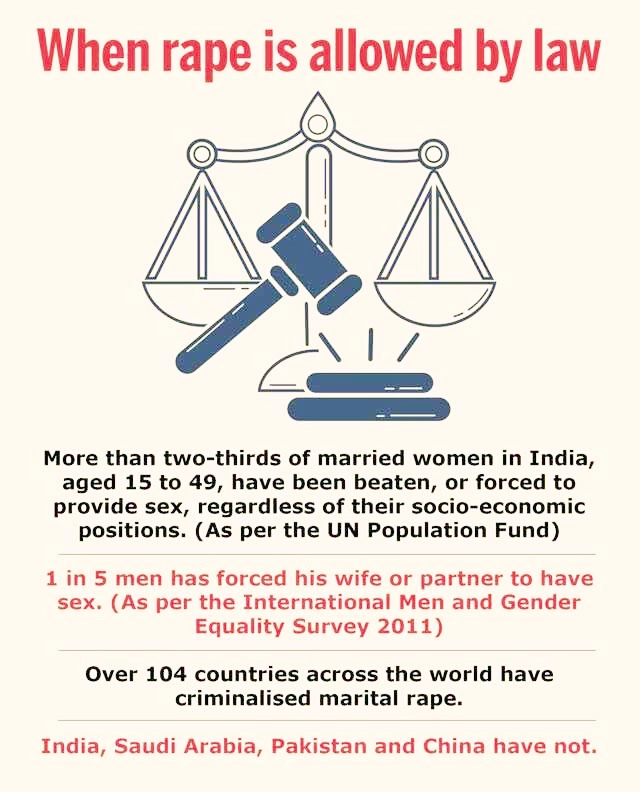Indian Society
Criminalising Marital Rape
- 15 Jan 2022
- 5 min read
For Prelims: Section 375 of the IPC, Section 498A of IPC, Justice J. S. Verma Committee.
For Mains: Criminalisation of Marital Rape, Section 375 of the IPC, National Crime Records Bureau (NCRB) data, Justice J. S. Verma Committee, Protection of Women from Domestic Violence Act, 2005.
Why in News
Recently, a batch of petitions seeking criminalisation of marital rape, has been filled in the Delhi High Court.
- In response to it the Union government has replied that it is considering a “constructive approach” towards criminalising it and had sought suggestions from various stakeholders.
- The petition seeks to amend the criminal law, which includes Section 375 (rape) of the Indian Penal Code (IPC).
Key Points
- Background:
- The grounds for “marital immunity” for rape prosecution have emerged from the patriarchal discourse in society.
- According to which, a husband cannot be guilty of a rape committed upon his lawful wife because she has given up herself in this kind to her husband by their mutual matrimonial consent and contract, which she cannot retract.
- Under the impact of the second wave of feminism in the seventies, Australia became the first common law country to pass reforms in 1976 and after it, many Scandinavian and European countries made rape in marriage a criminal offence.
- The grounds for “marital immunity” for rape prosecution have emerged from the patriarchal discourse in society.
- Legal Provision Regarding Marital Rape:
- Marital Rape Exception: Section 375 of the Indian Penal Code, which exempts forceful sexual intercourse by a man with his own wife from the offence of rape, provided the wife is above 15 years of age, also known as the “marital rape exception”.
- Issues With Marital Rape Exception:
- Against Basic Rights of Women: This exception clause violates the women’s fundamental right to equality, freedom of speech and expression, and most of all the right to life and personal liberty.
- It also denies the agency over their own bodies to women.
- Dismal State of Judicial System: Some of the reasons for low rates of prosecution in the cases of marital rape in India include:
- Low reporting of crimes due to societal conditioning and low legal awareness.
- Inaccurate method of collection of National Crime Records Bureau (NCRB) data.
- Out of court settlements due to the lengthy process of justice/lack of admissible proof.
- Justice J. S. Verma Committee Recommendation: The Justice J. S. Verma Committee, constituted in the aftermath of the horrific Nirbhaya gang rape in 2012.
- While some of its recommendations helped shape the Criminal Law (Amendment) Act, 2013, its most radical suggestions, including on marital rape, were swept under the carpet.
- Against Basic Rights of Women: This exception clause violates the women’s fundamental right to equality, freedom of speech and expression, and most of all the right to life and personal liberty.
- Government’s Stand:
- Distablisng Effect on Institution of Marriage: Uptil now, the government has said on multiple occasions that criminalising marital rape will threaten the institution of marriage and will also impinge the right to privacy.
- Misuse of Legal Provisions: There is a growing misuse of Section 498A (harassment caused to a married woman by her husband and in-laws) of IPC and the Protection of Women from Domestic Violence Act, 2005.
- Criminalising marital rape could become an easy tool for harassing husbands.
Way Forward
- Multi-stakeholder Approach: The criminalisation of marital rape will be a symbolic start for sure.
- The sentencing could be decided by an expert committee consisting of medical personnel, family counsellors, judges and police on the basis of varied aspects like the couple’s sexual history, physical and psychological harm to the victim.
- Bringing Behavioural Changes: Statutory reform should be accompanied with awareness campaigns sensitising the public (civilians, police, judges, medical personnel) on the importance of consent, timely medical care and rehabilitation, skill development and employment for facilitating economic independence of victims.





